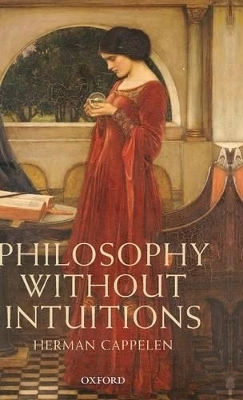
Philosophy without Intuitions
Seiten
2012
Oxford University Press (Verlag)
978-0-19-964486-5 (ISBN)
Oxford University Press (Verlag)
978-0-19-964486-5 (ISBN)
The standard view of philosophical methodology is that philosophers rely on intuitions as evidence. Herman Cappelen argues that this claim is false, and reveals how it has encouraged pseudo-problems, presented misguided ideas of what philosophy is, and misled exponents of metaphilosophy and experimental philosophy.
The claim that contemporary analytic philosophers rely extensively on intuitions as evidence is almost universally accepted in current meta-philosophical debates and it figures prominently in our self-understanding as analytic philosophers. No matter what area you happen to work in and what views you happen to hold in those areas, you are likely to think that philosophizing requires constructing cases and making intuitive judgments about those cases. This assumption also underlines the entire experimental philosophy movement: only if philosophers rely on intuitions as evidence are data about non-philosophers' intuitions of any interest to us. Our alleged reliance on the intuitive makes many philosophers who don't work on meta-philosophy concerned about their own discipline: they are unsure what intuitions are and whether they can carry the evidential weight we allegedly assign to them.
The goal of this book is to argue that this concern is unwarranted since the claim is false: it is not true that philosophers rely extensively (or even a little bit) on intuitions as evidence. At worst, analytic philosophers are guilty of engaging in somewhat irresponsible use of 'intuition'-vocabulary. While this irresponsibility has had little effect on first order philosophy, it has fundamentally misled meta-philosophers: it has encouraged meta-philosophical pseudo-problems and misleading pictures of what philosophy is.
The claim that contemporary analytic philosophers rely extensively on intuitions as evidence is almost universally accepted in current meta-philosophical debates and it figures prominently in our self-understanding as analytic philosophers. No matter what area you happen to work in and what views you happen to hold in those areas, you are likely to think that philosophizing requires constructing cases and making intuitive judgments about those cases. This assumption also underlines the entire experimental philosophy movement: only if philosophers rely on intuitions as evidence are data about non-philosophers' intuitions of any interest to us. Our alleged reliance on the intuitive makes many philosophers who don't work on meta-philosophy concerned about their own discipline: they are unsure what intuitions are and whether they can carry the evidential weight we allegedly assign to them.
The goal of this book is to argue that this concern is unwarranted since the claim is false: it is not true that philosophers rely extensively (or even a little bit) on intuitions as evidence. At worst, analytic philosophers are guilty of engaging in somewhat irresponsible use of 'intuition'-vocabulary. While this irresponsibility has had little effect on first order philosophy, it has fundamentally misled meta-philosophers: it has encouraged meta-philosophical pseudo-problems and misleading pictures of what philosophy is.
Herman Cappelen is a professor of philosophy at the University of St Andrews, where he works at the Arché Philosophical Research Centre. He works in philosophy of language, philosophical methodology and related areas of epistemology, metaphysics, and philosophy of mind. He is the author of many papers and three books: Insensitive Semantics (with Ernest Lepore), Language Turned on Itself (with Ernest Lepore), and Relativism and Monadic Truth (with John Hawthorne).
PART I: THE ARGUMENT FROM 'INTUITION'-TALK; PART II: THE ARGUMENT FROM PHILOSOPHICAL PRACTICE
| Verlagsort | Oxford |
|---|---|
| Sprache | englisch |
| Maße | 146 x 222 mm |
| Gewicht | 438 g |
| Themenwelt | Geisteswissenschaften ► Philosophie ► Philosophie der Neuzeit |
| ISBN-10 | 0-19-964486-1 / 0199644861 |
| ISBN-13 | 978-0-19-964486-5 / 9780199644865 |
| Zustand | Neuware |
| Haben Sie eine Frage zum Produkt? |
Mehr entdecken
aus dem Bereich
aus dem Bereich


